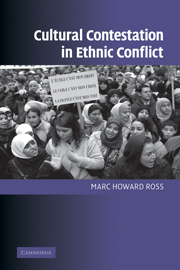Book contents
- Frontmatter
- Contents
- List of figures
- Preface
- 1 Introduction: easy questions and hard answers, what are they fighting about?
- 2 The political psychology of competing narratives
- 3 Narratives and performance: ritual enactment and psychocultural dramas in ethnic conflict
- 4 Loyalist parades in Northern Ireland as recurring psychocultural dramas
- 5 Where is Barcelona? Imagining the nation without a state
- 6 Digging up the past to contest the present: politics and archeology in Jerusalem's Old City
- 7 Dressed to express: Islamic headscarves in French schools
- 8 The politics of memory and memorialization in post-apartheid South Africa
- 9 Enlarging South Africa's symbolic landscape
- 10 Flags, heroes, and statues: inclusive versus exclusive identity markers in the American South
- 11 Culture's central role in ethnic conflict
- References
- Index
- Cambridge Cultural Social Studies
11 - Culture's central role in ethnic conflict
Published online by Cambridge University Press: 22 September 2009
- Frontmatter
- Contents
- List of figures
- Preface
- 1 Introduction: easy questions and hard answers, what are they fighting about?
- 2 The political psychology of competing narratives
- 3 Narratives and performance: ritual enactment and psychocultural dramas in ethnic conflict
- 4 Loyalist parades in Northern Ireland as recurring psychocultural dramas
- 5 Where is Barcelona? Imagining the nation without a state
- 6 Digging up the past to contest the present: politics and archeology in Jerusalem's Old City
- 7 Dressed to express: Islamic headscarves in French schools
- 8 The politics of memory and memorialization in post-apartheid South Africa
- 9 Enlarging South Africa's symbolic landscape
- 10 Flags, heroes, and statues: inclusive versus exclusive identity markers in the American South
- 11 Culture's central role in ethnic conflict
- References
- Index
- Cambridge Cultural Social Studies
Summary
Introduction
Unlike most political analyses of ethnic conflict, the one offered here has not emphasized the detailed history of specific disputes, all the substantive issues separating the parties, or the institutional arrangements that often dominate such discussions. This is not because these elements do not matter; rather, it is because they are not all that matters. Political analyses tend to ignore, dismiss, or under-theorize the role that identity and emotional framing play in long-term conflicts. In order to address this imbalance, I focus here on the role of cultural expression and enactment and link them to conflict expansion and settlement. This is not a rejection of structural and institutional analyses, but an effort to expand a what is considered relevant.
Early in 2005 the news was filled with stories of conflict involving emotionally powerful cultural enactments and expressions intertwined with substantive issues. There were Chinese demonstrations against Japan protesting changes in Japanese school textbooks that seemed to downplay Japanese World War II atrocities, including the 1937 Rape of Nanking. Analysts linked the current protests to Japan's push for a permanent seat on the UN Security Council and economic competition in East Asia. Following the mounting protests, Japan expressed “deep remorse” for the tremendous damage and deep suffering it caused during the war. However, this was not sufficient and Chinese President Hu Jintao held a meeting with Japanese Prime Minister Junichiro Koizumi in which Jintao said Koizumi's controversial visits to Tokyo's Yasukuni shrine honoring war criminals are the “crux” of the problem in Sino-Japanese ties and had prevented state visits by either leader to the other's country for the past three years.
- Type
- Chapter
- Information
- Cultural Contestation in Ethnic Conflict , pp. 312 - 328Publisher: Cambridge University PressPrint publication year: 2007
- 1
- Cited by



